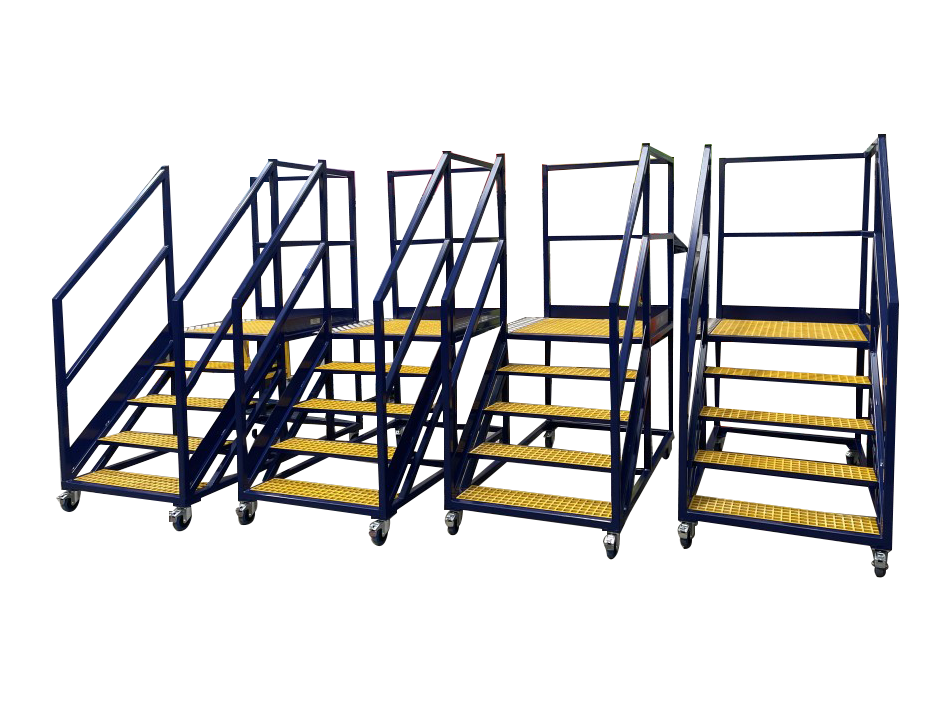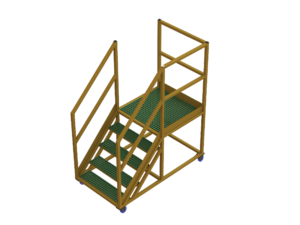Warehouse Access Steps
Warehouse Access Steps
Scope To design and manufacture a safe and stable solution for the unloading of containers. Solution Project REF: AD-212-2013-07-1 / 12508-P1 Warehouse steps are a stable structure designed to provide a safe and secure work area at elevated heights.…
Read More
Scope
To design and manufacture a safe and stable solution for the unloading of containers.
Solution
Project REF: AD-212-2013-07-1 / 12508-P1
Warehouse steps are a stable structure designed to provide a safe and secure work area at elevated heights. These platforms are commonly used in various industries, including construction, manufacturing, and maintenance, to facilitate tasks that require workers to operate above ground level. Warehouse steps are essential for enhancing workplace safety and efficiency in tasks performed at height. By providing a stable, accessible, and regulated environment, these platforms help minimize risks and facilitate various industrial and construction activities.
Warehouse steps are crucial for offloading containers for several reasons:
- Efficiency: Streamlined processes ensure quick unloading of containers, minimising downtime and optimising workflow.
- Accuracy: Systematic inspection and documentation during the receiving phase help verify that the correct items are received and reduce errors.
- Organisation: Proper sorting and placement of goods facilitate easier access and retrieval, improving overall warehouse organisation.
- Safety: Established procedures enhance safety during the offloading process, reducing the risk of accidents and injuries.
- Inventory Management: Effective tracking of incoming goods allows for better inventory control, preventing stock outs and overstock situations.
- Cost-Effectiveness: Efficient offloading processes reduce labor costs and improve resource utilisation, leading to overall cost savings.
- Customer Satisfaction: Faster and more accurate handling of container offloading ensures timely order fulfillment, enhancing customer satisfaction.
Warehouse steps are crucial for managing the flow of goods through receiving, storing, and distributing inventory efficiently. These steps enhance operational efficiency, accuracy, safety, and customer satisfaction, making them fundamental to successful warehouse operations.
Warehouse steps, which involve systematic processes for managing inventory and logistics, can be effectively adapted and applied in various other industries beyond traditional warehousing and distribution. Here are some ways these steps can be utilised in different sectors:
1. Manufacturing
- Material Handling: Similar to receiving goods in a warehouse, manufacturing plants can use these steps to receive raw materials and components, ensuring quality control and accurate inventory levels.
- Production Planning: By tracking inventory closely, manufacturers can ensure they have the necessary materials on hand, optimising production schedules.
2. Retail
- Inventory Management: Retailers can implement warehouse steps to manage stock levels efficiently, from receiving products to displaying them on shelves.
- Order Fulfillment: The steps for picking and packing can be used to process online orders, enhancing customer service through timely deliveries.
3. Healthcare
- Supply Chain Management: Hospitals and clinics can adopt warehouse steps to manage medical supplies and pharmaceuticals, ensuring that critical items are always in stock and properly tracked.
- Receiving and Storing Supplies: Implementing systematic processes for receiving and storing medical equipment can enhance operational efficiency and patient care.
4. Food and Beverage
- Inventory Control: Food producers and distributors can utilise warehouse steps for managing perishable items, ensuring timely rotation and minimising waste.
- Quality Assurance: Procedures for receiving and inspecting products can help maintain safety and quality standards in food handling.
5. Pharmaceuticals
- Compliance and Safety: Steps related to receiving, storing, and tracking inventory can ensure compliance with regulations and enhance safety in the handling of drugs.
- Returns Management: Efficient processes for managing product returns can help in handling recalls and expired medications.
6. E-commerce
- Order Processing: The systematic steps of picking, packing, and shipping can be directly applied to streamline e-commerce order fulfillment.
- Returns Handling: E-commerce businesses can use warehouse steps to effectively manage returns, which are critical in online retail.
7. Construction
- Material Logistics: Construction sites can implement warehouse steps to manage the delivery, storage, and retrieval of building materials, ensuring that supplies are available when needed.
- Inventory Tracking: Systematic tracking can help monitor material usage and reduce waste on job sites.
8. Technology and Electronics
- Receiving and Testing: Steps can be used for receiving electronic components, with processes for inspecting and testing items before they are put into production or inventory.
- Order Fulfillment: Efficiently handling orders for technology products ensures timely deliveries and customer satisfaction.
Compliance with BS Guidelines enhances safety, efficiency, quality, accountability, customer satisfaction, cost-effectiveness, adaptability, and data management in warehouse operations. Designing warehouse steps to comply with British Standards (BS) Guidelines is crucial for several reasons:
- Safety Compliance: Adhering to BS Guidelines reduces safety risks, minimises accidents, and ensures legal compliance, helping to avoid fines.
- Operational Efficiency: These standards promote streamlined processes and consistency, leading to faster operations and improved productivity.
- Quality Assurance: Following standardised practices helps maintain high-quality handling and storage of products, enhancing inventory accuracy.
- Employee Training and Accountability: Clear protocols assist in training employees and make it easier to hold them accountable for their performance.
- Customer Satisfaction: Compliance enhances order accuracy and fulfillment speed, leading to higher customer trust and reliability.
- Cost Efficiency: Effective design reduces waste and can lower insurance costs, resulting in overall cost savings.
- Adaptability and Scalability: Aligning with recognised standards allows for easier adaptation to changes and facilitates scalability as the business grows.
- Data Management and Reporting: Following standards improves record-keeping and allows for informed decision-making based on reliable data.
See below our information guide about how we use BS to design our access platforms:
Acres have a range of standard products but also support clients with custom machinery and medium-high volume products such as trolleys, stillages etc.
We have manufactured lots of different tables / workstations / workbenches for various industries.
We also manufacture access platforms, jigs and fixtures and many other types of production support solutions / products.
Talk to us today about your requirements: [email protected] / 01332695240 / Contact Us Form
Click on the icon to check out our social media! Please follow, like and share!
Want to know more about Acres Engineering?
We are based in the UK from our Headquarters in Derbyshire, England and have a European office in Malaga, Spain within the EU.
Find out more about where we have been and what we have been up to by checking out our latest blog posts.
Take a look at how we support of the Armed Forces, STEM/Schools and Charities.
As a world leader in our field, we offer a range of information guides sharing best practice with our clients.
We make it easy to engage with us, we are approved on: EcoVadis (external) / JOSCAR (external) / AVETTA (external) / COUPA (external) / SAP ARIBA (external) / DEEPSTREAM (external) ….you can download our BSI / Insurance certificates here.




![]()
![]()
![]()
Have a design and development project you want the Acres team to look at? Can’t see what you want? Need something different?
Acres Engineering is established as a leader in delivering bespoke creative engineered solutions. Many OEM’s and tier one/ two suppliers in aerospace, automotive, rail and power generation industries have chosen us as their solutions partner because of our innovative attitude towards individual challenges and commitment to continual improvement.







